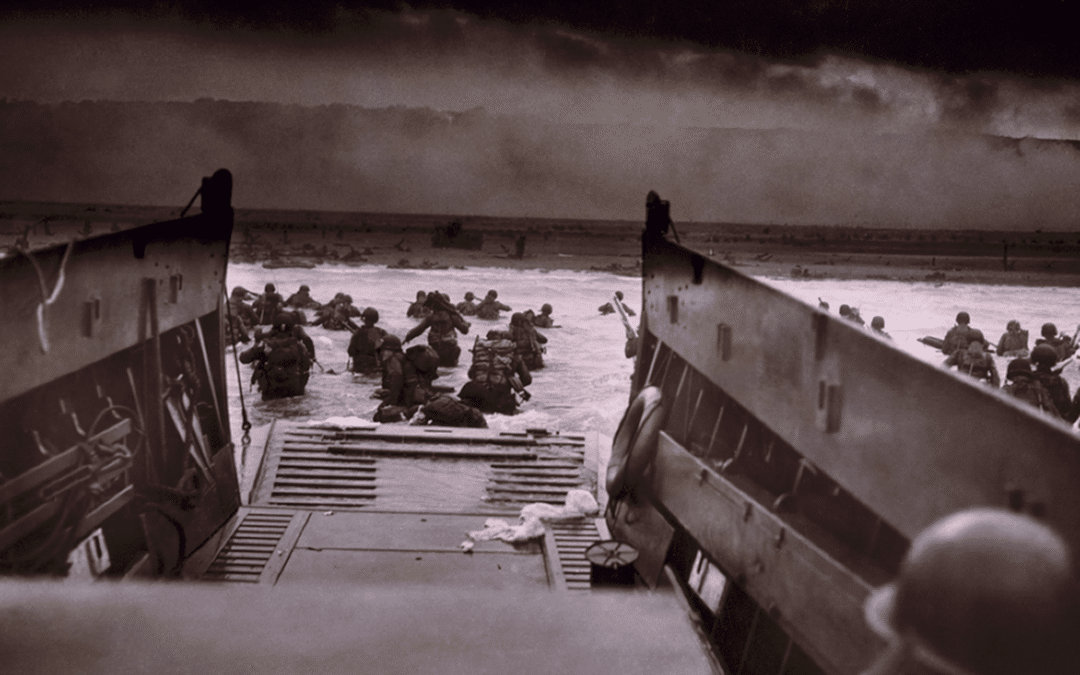In the early morning hours of June 6, 1944, thirty men from the small town of Bedford, Virginia, huddled close together in landing craft churning through the dark waters of the English Channel on a mission unlike any other the world had ever known. Their destination: a strip of sand known as Omaha Beach in Normandy, France.
Most of the thoughts running through the minds of these young men are lost to eternity. Surely there was no lack of thought of loved ones back home—wives, mothers, sweethearts and friends— loved ones who were now half a world away, shielded from the ferocity of war by the sprawling Blue Ridge.
These were fighting men trained for this mission, and they carried no misconception about what they would face once the landing craft gate dropped into the salty foam. Yet they also knew that if this mission failed, every freedom they had enjoyed while growing up in America was in danger of being stripped away by those who would not rest until the United States was brought to her knees in submission.
As the shells ripped through the steel plating of the landing craft, before they even reached the beach, the cries of the first casualties underscored for these men that this would indeed be a very rough day.
For many, it would be their last day on this earth.
Of the thirty men from Bedford, Virginia, who hit the beach that day, nineteen died within minutes of the initial assault by Allied forces. Nineteen. These were not mere statistics of war, they were men like Wallace Carter, Nick Gillaspie, John Reynolds and Grant Yopp. They were young men who would never come home, men who sacrificed it all so that the folks back home could continue to worship freely, speak their minds about tyrants and friends alike, and pursue the American dream.
In the years that followed that awful day on Omaha Beach, those few Bedford men who survived never fully escaped the trauma of that day. Before he passed away, the last of the “Bedford Boys”, Ray Nance, said of that June day so long ago, “I never really got over it, and I’m not sure if I ever will.”
Bedford, Virginia, whose population in 1944 was about 3,200, is now remembered by a smaller and smaller number of Americans as the community that proportionally suffered the nation’s severest D-Day losses, a fact preserved by National D-Day Memorial that stands in Bedford yet today.
The Bedford memorial is just one of thousands that dot the American landscape today in silent testimony to the steep price that has been paid so that you and I can enjoy the right to life, liberty, and the pursuit of happiness. You can find these memorials in places like Arlington National Cemetery, Gettysburg, Valley Forge, and on every courthouse square in Indiana.
Freedom isn’t free. It must be defended. This is our legacy as Americans. Yet even as we enjoy the benefits of that which has been purchased for us, we are desperately grappling to determine whether freedom, liberty, and justice remain as hallmarks of who we really are as a nation. The truth is that the freedoms we so often take for granted are just as much in jeopardy today as when our nation suffered thousands of casualties in the D-Day invasion that shifted the tide in World War II.
All of it rests on the unalienable right to life. An America stripped of this right is an America where all other liberties fall, and where we cease to be the City on a Hill to which the rest of the world streams for its best hope for freedom.
It was President Abraham Lincoln who understood best that the greatest threat to America’s freedoms would come from within, speaking these words in a speech to the Young Men’s Lyceum in Springfield, Illinois, in 1838:
“At what point shall we expect the approach of danger? By what means shall we fortify against it? Shall we expect some transatlantic military giant, to step the Ocean, and crush us at a blow? Never! All the armies of Europe, Asia and Africa combined, with all the treasure of the earth (our own excepted) in their military chest; with a Buonaparte for a commander, could not by force, take a drink from the Ohio, or make a track on the Blue Ridge, in a trial of a thousand years. At what point, then, is the approach of danger to be expected? I answer, if it ever reach us it must spring up amongst us. It cannot come from abroad. If destruction be our lot, we must ourselves be its author and finisher. As a nation of freemen, we must live through all time, or die by suicide.”
These are sobering words from the man with Hoosier roots who guided this nation through the furnace of the Civil War. Yet these words are as pertinent today as they were in 1838.
We are wise to emblazon the words of Lincoln deep onto our hearts and minds.
On this Memorial Day, let us pause and reflect on the truth that the soul of who we are is not defined by the latest polls, political expediency, the state of our economy, or the interest rate on our homes, but by our adherence to the founding principles that drove men like the Bedford Boys, and thousands of others, to lay down their lives on Omaha Beach.
What will we do with such a great legacy?
Mike Fichter
President and CEO
Indiana Right to Life


Recent Comments